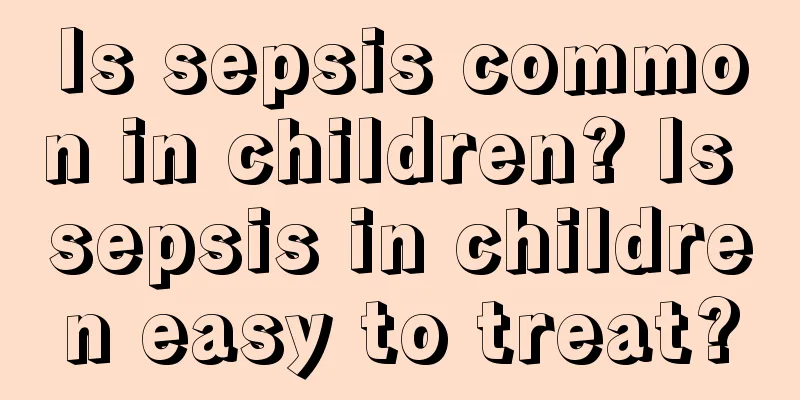Do breastfed babies need to be fed water? The importance of breastfeeding

|
Breast milk is the best nutritional food for the growth and development of babies. So does a breastfed baby need to be fed with extra water? What are the advantages of breastfeeding over feeding with formula? Let's take a look~ Do breastfed babies need water?Many parents who feed their babies milk powder know that milk powder is more likely to cause internal heat than breast milk, so mixed-fed babies and formula-fed babies often need to be fed water to relieve the internal heat caused by milk powder. So do breastfed babies not need to drink water? It actually depends on the situation. Generally speaking, it is not good for babies under 3 months old to drink too much or too little water, because their kidney function is not yet fully developed. If the baby is fed with breast milk and does not cry after feeding, then there is no need to feed water. If the baby cries and has a dry mouth, then appropriate water should be added. So in what cases should water be fed to babies? Normally, babies who are exclusively breastfed do not need to be fed water until they are about six months old, because 70% of breast milk is water. If there is enough breast milk, it means that the baby has enough water in his body. But it is different for babies fed with formula milk. Although formula milk is made of milk powder and water, the ingredients of milk powder are somewhat different from breast milk, and it is more likely to cause internal heat, so water should be fed between every two feedings. Babies who are exclusively breastfed also need to be fed water in some special circumstances. One is when the baby has a cold and fever. Children often have minor illnesses such as colds and fevers due to their weak constitution. Colds and fevers often cause babies to sweat a lot, and sometimes they also have diarrhea. Therefore, babies at this time lack a lot of water, and the water balance in the body is unbalanced. They need to replenish enough water in time to avoid causing internal body dysfunction. The second is when the baby is constipated. It is common for babies to suffer from constipation. There are many reasons for constipation. However, if you give your baby water on a regular basis, you can use water to lubricate the intestines and prevent constipation. The third is when the weather is dry and hot. In summer, both formula feeding and breastfeeding need to be supplemented with water, because the weather is hot and babies sweat a lot, so you can feed your baby water between two feedings, and the amount of water should be determined according to the actual situation of the baby. In addition to warm boiled water, when the baby can add complementary food, you can prepare some carrot water or vegetable water for the baby, so that you can supplement water and vitamins at the same time, but the vegetable water should be cooked and drunk immediately, otherwise it will deteriorate if left for too long. When feeding water to your baby, be careful not to feed the baby water soaked in honey, and do not add sugar to the water. Although babies will like water every day, honey contains a toxic substance that babies cannot digest. Moreover, this sweet water will not only not help the baby replenish water, but may also affect the baby's diet. Breastfeeding precautionsFor babies, breast milk is the best food, and breastfeeding is the most scientific feeding method! Breast milk contains all the nutrients that babies need, and is very easy to digest and absorb; it is rich in amino acids, lactose and other substances, which also promote the brain development of babies. However, new mothers may not know what to pay attention to when breastfeeding. Now, Mama.com Encyclopedia will share the precautions for breastfeeding. 1. Each time you breastfeed, let your baby eat one breast first until it is empty. Your baby may slow down his feeding, suck on the nipple for comfort, then let go of the nipple, or fall asleep with the nipple in his mouth. 2. After one breast is empty, pat the baby's back and switch to the other breast for breastfeeding. 3. Some babies want to eat from both breasts every time they are breastfed, while others only need to eat from one side. If the baby eats from one side and then the other, let the baby eat until he is full. 4. After feeding, the baby will look full, relaxed and satisfied. Importance of BreastfeedingBenefits of Breastfeeding for Babies 1. Provide adequate nutrition (1) Breast milk contains the most natural nutrients. The ratio of lactoprotein to casein in breast milk protein is most suitable for the needs of newborns and premature infants, ensuring the complete metabolism of amino acids and preventing the accumulation of excessive phenylalanine and tyrosine. (2) The composition of breast milk changes as the baby grows older to adapt to the baby's needs and cannot be replaced by other milk substitutes. 2. Protect baby's health (1) Protect infants from infection, diarrhea, otitis media, and allergic diseases. Breastfeeding reduces the possibility of bacterial infection. Breast milk can enhance the disease resistance of newborns. Colostrum and transitional milk are rich in secretory IgA, which can enhance the respiratory resistance of newborns. Breast milk contains high levels of lysozyme and macrophages, which can be directly sterilized. Lactose helps the growth of lactobacilli and bifidobacteria, and contains a lot of lactoferrin, which can effectively inhibit the growth and activity of Escherichia coli, protect the intestinal mucosa, prevent the mucosa from bacterial invasion, and enhance the resistance of the gastrointestinal tract. (2) Reduce the risk of sudden infant death syndrome (SIDS) and necrotizing enterocolitis (NEC). Breast milk has a high content of unsaturated fatty acids, which are easily absorbed. The calcium-phosphorus ratio is appropriate, and the main carbohydrate is lactose, which is beneficial for calcium absorption. The total osmotic pressure is not high, and it is not likely to cause necrotizing enterocolitis. (3) Prevent allergic diseases such as asthma, allergic eczema, etc. (4) Prevent chronic diseases such as obesity, hypertension, and diabetes. Studies have shown that newborns who are breastfed are much less likely to develop cardiovascular disease and diabetes in adulthood than those who are not breastfed. 3. Promote baby development (1) Promote the development of brain cells and intelligence. Breast milk contains high levels of cysteine and aminotaurine, which are beneficial to the brain growth of newborns and promote intellectual development. (2) Sucking movements promote the development of language skills. 4. It is beneficial to enhance the mother-infant relationship, enable the newborn to get more maternal love, increase their sense of security, help establish good interpersonal relationships in adulthood, and lay the foundation for the cultivation of the baby's emotional intelligence. Benefits of breastfeeding for mothers1. Promote postpartum recovery (1) Promote uterine recovery and reduce postpartum hemorrhage. (2) Reduce the risk of breast cancer and ovarian cancer in mothers. (3) Help mothers regain their body shape as quickly as possible and consume 500 calories per day. 2. It enhances the relationship between mother and child and plays an important role in the communication between mother and baby throughout their life. Benefits of breastfeeding for the family 1. Economy: save time, reduce expenditure and reduce waste. 2. Convenience: Available at any time, saving time and effort, and reducing pollution. 3. Worry-free: Breastfed babies are healthier and allow parents to have more energy to cope with stressful work. The social benefits of breastfeeding 1. Breastfed children have good physical fitness and are less likely to get sick, which is beneficial to improving the physical fitness of the entire population. 2. Breastfeeding mothers are kind to their babies, which helps the development of children's intelligence and social skills, and contributes to family harmony and social stability. |
<<: What is the most suitable age for babies to attend talent classes?
>>: What do fathers need to do in early childhood education?
Recommend
What to do if your baby won't eat the bottle? What to do if your baby won't eat the bottle?
Many mothers who have been breastfeeding for a lo...
Will calcium deficiency affect children's sleep? Will calcium deficiency affect children's growth?
Usually, children's growth and development ca...
How to reduce the abdomen after childbirth? Is it better to use a belly belt or a body shaping garment after childbirth?
After giving birth, the skin on a woman's abd...
Does emotion affect pregnancy? Does bad emotion affect pregnancy?
Will bad mood affect pregnancy? Many people are v...
oralpaedon electrolyte water instructions oralpaedon electrolyte water usage and dosage
Oralpaedon electrolyte water is a supplement for ...
How to massage edema during pregnancy and pay attention to diet and rest
Edema during pregnancy is a problem that more tha...
Does smog weather affect pregnancy?
The persistent smog in many cities has seriously ...
The harm of sexual life in late pregnancy Frequent fetal movement after sex in late pregnancy
Having sex in the late pregnancy is not only inco...
How many days of pregnancy can you detect early pregnancy symptoms
Some young couples are still very inexperienced w...
Can a one-year-old baby eat shiitake mushrooms? At what age can a baby eat shiitake mushrooms?
Shiitake mushrooms are a type of fungus food, and...
Should baby underwear be changed every day in winter? How to change underwear
In winter, babies need to wear underwear to keep ...
Can I drink milk powder if I am infected with norovirus? Can I drink milk powder if I am infected with norovirus?
My baby used to drink milk powder, but recently h...
Are Dawang wet wipes good to use? How are Dawang wet wipes?
Dawang's maternal and infant products have a ...
How can a baby sleep to have a good head shape?
Many mothers may have heard that when a baby is y...
What are the symptoms of heat stroke in babies? How to judge whether babies have heat stroke in summer?
When babies are very young, they cannot express t...









